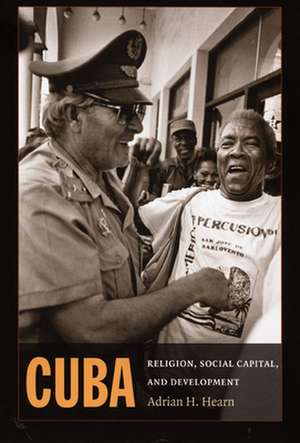Cuba – Religion, Social Capital, and Development
Autor Adrian H. Hearnen Limba Engleză Paperback – 17 aug 2008
Preț: 238.39 lei
Nou
Puncte Express: 358
Preț estimativ în valută:
45.62€ • 47.75$ • 37.97£
45.62€ • 47.75$ • 37.97£
Carte tipărită la comandă
Livrare economică 31 martie-14 aprilie
Preluare comenzi: 021 569.72.76
Specificații
ISBN-13: 9780822341963
ISBN-10: 0822341964
Pagini: 232
Ilustrații: 23 illustrations
Dimensiuni: 155 x 234 x 18 mm
Greutate: 0.34 kg
Editura: MD – Duke University Press
ISBN-10: 0822341964
Pagini: 232
Ilustrații: 23 illustrations
Dimensiuni: 155 x 234 x 18 mm
Greutate: 0.34 kg
Editura: MD – Duke University Press
Cuprins
Acknowledgments vii
Introduction: Structure and Spirit 1
Chapter 1. Spirits in Motion: Folklore and Function 31
Chapter 2. State Decentraliation and the Collaborative Spirit 67
Chapter 3. Sustainable Sovereignty: International NGOs and Civil Society in Cuba 103
Chapter 4. Patriotic Spirits: Religious Welfare Programs and Politics of Syncretism 135
Conclusion: Development and Dialogue 181
Notes 191
References 195
Index 213
Introduction: Structure and Spirit 1
Chapter 1. Spirits in Motion: Folklore and Function 31
Chapter 2. State Decentraliation and the Collaborative Spirit 67
Chapter 3. Sustainable Sovereignty: International NGOs and Civil Society in Cuba 103
Chapter 4. Patriotic Spirits: Religious Welfare Programs and Politics of Syncretism 135
Conclusion: Development and Dialogue 181
Notes 191
References 195
Index 213
Recenzii
This is one of the best studies on civil society in Cuba that I have read. Adrian H. Hearn combines first-rate ethnography, theoretical sophistication, and a solid understanding of the complexities of the Cuban political context. By focusing on Afro-Cuban religious communities and international NGOs, Hearn shows how the interpenetration of state and citizen action has shaped civil society in Cuba. The result is a fascinating analysis of the ongoing transformations within the Cuban Revolution. Ariel C. Armony, Katz Distinguished Associate Professor of Government, Colby CollegeThis volume reveals the complexity of Cuban society through remarkable ethnographic research. Based on years of research in Cuba, the work documents the inner workings of communities that use deeply held religious beliefs to promote development projects aimed at securing basic needs. Through skillful analysis, Adrian H. Hearn reveals the realities of life for ordinary Cubans. This book is a major contribution to our understanding of contemporary Cuba, as well as an exemplar for all those interested in how religion and community development can intersect. Margaret Crahan, author of Religion, Culture, and Society: The Case of CubaAdrian Hearn throws some piercing insights into the complex relationship between the Cuban state and grassroots neighbourhood initiatives and formal and informal local organisations that, the author contends, have flourished after the collapse of the Soviet Union and the onset of what was known as the special period in peace time...the book contains an astonishing amount of detailed knowledge of local social and cultural projects in various poor districts in Havana Francisco Domínguez, Times Higher Education, December 2008
Textul de pe ultima copertă
"This is one of the best studies on civil society in Cuba that I have read. Adrian H. Hearn combines first-rate ethnography, theoretical sophistication, and a solid understanding of the complexities of the Cuban political context. By focusing on Afro-Cuban religious communities and international NGOs, Hearn shows how the interpenetration of state and citizen action has shaped civil society in Cuba. The result is a fascinating analysis of the ongoing transformations within the Cuban Revolution."--Ariel C. Armony, Katz Distinguished Associate Professor of Government, Colby College
Notă biografică
Adrian H. Hearn
Descriere
Argues that grassroots cultural actors and religious organizations have come to play an important role in social development in Cuba.
